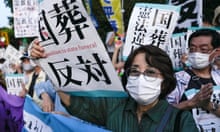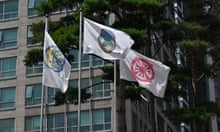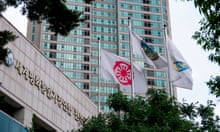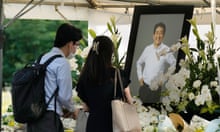Japan’s prime minister, Shinzo Abe, has said he will resign because of his declining health, telling a shocked country that the return of a chronic bowel condition had left him unable to steer it through the coronavirus pandemic.
“Poor health should not influence political decisions, and as long as I am unable to meet the expectations of the Japanese people, I have decided that I cannot stay on as prime minister and will step down,” Abe told a televised news conference on Friday.
“In politics, the most important thing is to produce results. For seven years and eight months, I have done my best to get results, but I have been struggling with my illness and I need treatment.”
He declined to comment on who might replace him as leader of Liberal Democratic party [LDP] and prime minister, but candidates include his finance minister, Taro Aso, and Shigeru Ishiba, a longtime critic. Abe, whose term was supposed to end in September 2021, is expected to stay on until his party elects a new leader, who must then be approved by parliament.
“I have lost a lot of my energy and strength,” he said. He also apologised for leaving office before resolving the cold war abductions of Japanese citizens by North Korea and a territorial dispute with Russia. “It is gut wrenching to have to leave my job before accomplishing my goals,” he said.
He said he had been able to manage his illness, which he has lived with since his teens, until a regular medical checkup in June revealed signs that it had returned. His health had deteriorated since the middle of last month, he added.
Abe said he would start a new treatment that requires regular injections, but that there was no guarantee it would work. “I don’t want to create a sudden vacancy because of my illness, which is why I decided to resign after I received the results of my latest tests this week.
“The greatest challenge facing us now is our response to the coronavirus. There should be no disruption to that.”
The 65-year-old was given a second chance as prime minister in late 2012 after newly available drugs helped him manage the symptoms of ulcerative colitis, a condition that helped bring his first stint as leader to a premature end in 2007.
Friday’s announcement came days after Abe became Japan’s longest serving prime minister, breaking the record for consecutive days in office set by his great uncle, Eisaku Sato, half a century ago.
His resignation brings end to a period in office that began with vows to reform the economy after decades of stagnation, counter China’s growing influence in the region and give a more prominent role to Japan’s self-defence forces.
He leaves office with a mixed record at home and abroad, and with regret that he was unable to fulfil his lifetime ambition of revising Japan’s pacifist constitution.
Although rewriting the text of the constitution eluded him, Abe used his party’s dominance in parliament to push through a law in 2015 that allows the armed forces to engage in collective self-defence - the right to come to the aid of an ally even when Japan itself is not attacked.
Having promoted huge fiscal stimulus and monetary easing early on in his term, Abe failed to carry out the third pillar of his programme, which quickly became known as Abenomics” – structural reforms that would have addressed Japan’s ageing population and the lack of women in senior positions.
On the foreign policy front, Abe has overseen a slight thaw in relations with China, which had reached an historical low over competing claims to the disputed Senkaku islands in the East China Sea.
But he leaves office with relations between Japan and South Korea in tatters after the two countries failed to resolve historical disputes over wartime sex slaves and forced labourers.
Abe has gone further than any other leader of a major economy to endear himself to Donald Trump, using their shared love of golf to underline the importance of Washington’s security commitments to Japan in the face of a more assertive China and a nuclear-armed North Korea.
Despite persistent rumours about Abe’s health following two recent hospital visits, Shinichi Nishikawa, a professor of political science at Meiji University in Tokyo, said his resignation had come as a big surprise.
“It comes at a time when Japan is facing tough issues, including measures against the coronavirus,” he told Agence France-Presse. “There may be political confusion.”
Abe succeeded in bringing stability to the prime minister’s office for the first time since the maverick LDP reformer Junichiro Koizumi, who stepped down in 2006 after five years in office.
Along the way, Abe weathered ministerial resignations and scandals, his Teflon qualities enhanced by the absence of a credible opposition.
On Friday evening, a stunned LDP found itself confronting an unfamiliar political vacuum several months into a pandemic that has inflicted serious damage on the world’s third-biggest economy, and with the Tokyo Olympics, which has already been postponed, hanging in the balance.
The task of guiding Japan through the turbulence created by Abe’s unexpected departure could fall to Aso, a gaffe-prone rightwinger who also doubles as deputy prime minister.
Aso, 79, served as prime minister more than a decade ago and was in the post when the LDP was removed from office in a historic defeat in 2009.
Aso could face a challenge from Ishiba, a former defence minister and Abe critic who would be a popular choice among voters but has less support among LDP MPs.
Other potential candidates include Fumio Kishida, a former foreign minister who despite his dovishness is said to be Abe’s preferred successor, and Taro Kono, seen by some as eccentric but who has proven a dependable defence minister.
Yoshihide Suga, the dour chief cabinet secretary, would be a safer option, bringing experience to the job in his role as Abe’s longtime spokesman and confidante.
Abe’s resignation has almost certainly come too soon for the rising star Shinjiro Koizumi, the 39-year-old environment minister, whose political pedigree means his name is frequently linked with the office once occupied by his father, Junichiro.








